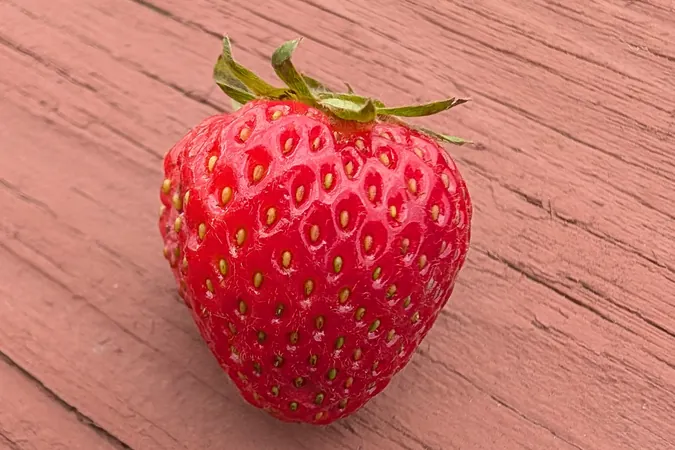
Unveiling the Pixel 10 Pro's 'Pro-Res Zoom': Photo or Fiction?
2025-08-29
Author: Ken Lee
A Game Changer or Just a Gimmick?
With the recent launch of the Pixel 10 Pro and its sibling the 10 Pro XL, Google has stirred the pot in photography with its innovative yet controversial feature: "Pro-Res Zoom." This technology claims to enhance your zoomed-in shots—going beyond 30x zoom—by running images through an AI processor. But here’s the catch: instead of merely sharpening existing details, the AI fills in blanks based on educated guesses. Is it a radical advancement or just an elaborate illusion?
The Magic of AI Recreation
At first glance, the results can be impressive. Consider the example of a strawberry captured at 50x zoom—its original photo is muddled and lacking in detail, typical of a camera sensor’s 5x optical zoom limit. However, the AI version breathes life into the image, leaving you wondering if it really is a photo. It appears vibrant and inviting, almost convincing enough to pass as reality. After all, who doesn’t want their strawberries looking succulent?
When Reality Starts to Slip Away
But don’t be fooled! As soon as the details fade, so does the effectiveness of this algorithm. In one shocking example of a stop sign photographed from 94x zoom, the familiar shape and letters of ‘STOP’ morph into white smudges. The resulting image feels like a dream—your brain tries to interpret the shapes, but they never truly resolve. It’s a digital hallucination that raises an uncomfortable question: are we losing touch with reality?
The Dual Nature of Photography
Now, let’s be fair: below the Pro-Res Zoom threshold, the Pixel 10 Pro delivers stunning, true-to-life photographs. With robust algorithmic processing for color and light, these images showcase Google’s longstanding reputation for exceptional camera technology. However, the moment you venture into the AI territory, it’s a different ballgame entirely.
Transparency in Technology
To its credit, Google isn’t hiding the fact that its AI is altering images. The Pixel 10 Pro supports C2PA (Coalition for Content Provenance and Authenticity) Content Credentials, marking AI-enhanced photos in their metadata. While this shows a commitment to transparency, stripping metadata isn’t rocket science, and not everyone knows how to find it. So, what does that mean for the average user?
The Future of Photography: A Personal Choice
Personally, I find myself hesitant to embrace the Pro-Res Zoom feature. I prefer my photos to remain true to their original form. If edits are necessary, I want to be the one to handle them to maintain authenticity. As smartphone technology evolves, we can expect more innovations like this one, pushing the boundaries of what we consider a photograph. In the age of digital manipulation, it'll be up to each of us to determine what we trust our eyes to see: a genuine photo or just a cleverly crafted picture.


 Brasil (PT)
Brasil (PT)
 Canada (EN)
Canada (EN)
 Chile (ES)
Chile (ES)
 Česko (CS)
Česko (CS)
 대한민국 (KO)
대한민국 (KO)
 España (ES)
España (ES)
 France (FR)
France (FR)
 Hong Kong (EN)
Hong Kong (EN)
 Italia (IT)
Italia (IT)
 日本 (JA)
日本 (JA)
 Magyarország (HU)
Magyarország (HU)
 Norge (NO)
Norge (NO)
 Polska (PL)
Polska (PL)
 Schweiz (DE)
Schweiz (DE)
 Singapore (EN)
Singapore (EN)
 Sverige (SV)
Sverige (SV)
 Suomi (FI)
Suomi (FI)
 Türkiye (TR)
Türkiye (TR)
 الإمارات العربية المتحدة (AR)
الإمارات العربية المتحدة (AR)